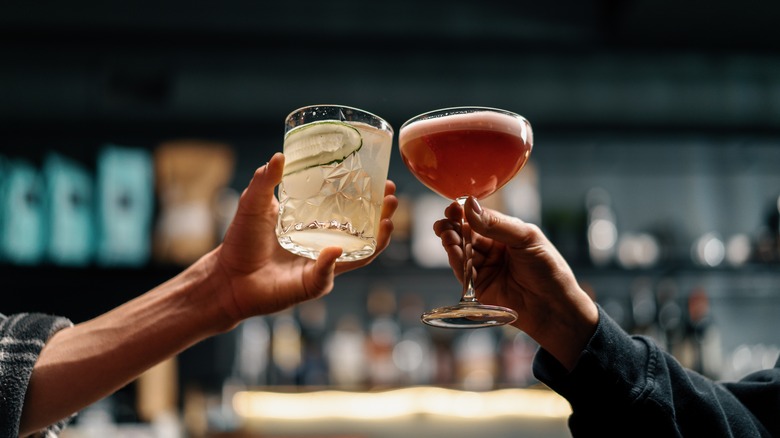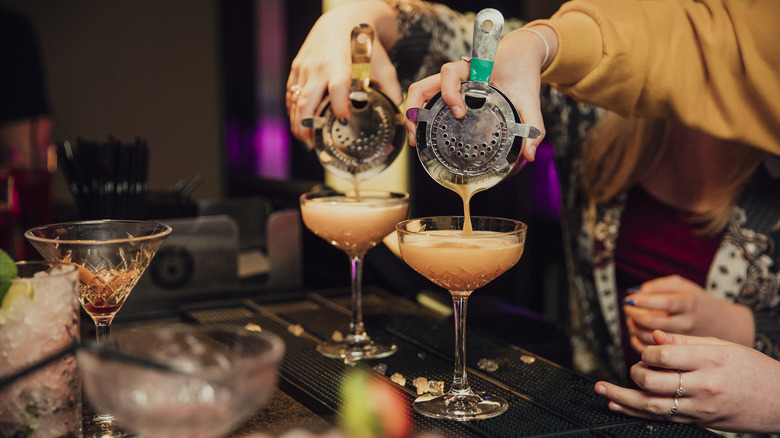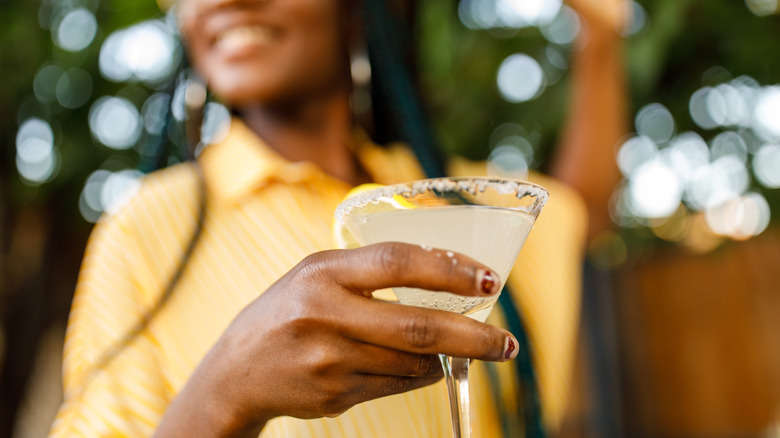The One Major Problem With Non-Alcoholic Cocktails
For those old enough to enjoy an alcoholic beverage, grabbing a drink with friends or co-workers is an opportunity to relax and socialize. It's not uncommon for a party to have a signature cocktail, and most eateries offer a selection of beer, wine, and even carefully crafted cocktails made with spirits. But heading to the bar or a party can be complicated for those who choose not to drink alcohol. Whether the person in question is sober, the designated driver, or simply doesn't like the taste of alcohol, there are plenty of reasons to order a non-alcoholic drink from the bar. According to a 2023 Gallup survey, 38% of Americans "abstain completely" from alcohol.
Having booze-free cocktails passed around at a party or displayed on the bar menu is a big deal for those who choose not to imbibe, but most recipes haven't yet been perfected. Many alcohol-free concoctions or virgin cocktails you know and love can be extremely sweet. When a traditional cocktail is mixed, many sugary ingredients are used to balance the bitterness of the spirits. When that bitter taste is removed, you are left with a cup full of simple sugars and mixers that are sweet enough to give you a cavity.
You might be replacing liquor with sugar
Those who grab a drink now and then are no strangers to overly sweet cocktails. From the array of blended fruity margaritas to the ever-popular espresso martini, some form of sugary sweetness is present in most mixed drinks. The mixed drink becomes even sweeter when you take away the alcohol, which can surprisingly still cause a hangover-like feeling. It turns out that copious amounts of sugar affect the body similarly to alcohol, especially in drink form. A sugar hangover can cause headaches, fogginess, and fatigue not unlike an alcohol-induced hangover.
The key to avoiding overly sweet non-alcoholic drinks is to balance the flavor profiles. Just like when mixing a regular cocktail, you want to blend sour, sweet, and bitter flavors. The problem to fix here is replacing the bitter or sour element lost by the absence of alcohol. So find the ingredient that works for you — whether that's lemon, sour cherry, cranberry, or even a small dash of bitters (if you're okay with trace amounts of alcohol). You may need to think outside of the box to find your new favorite mocktail recipe. Consider turning to spicy flavor profiles rather than sweet ones by adding a slice of jalapeño, a dash of cinnamon, or a tajin rim to your traditional mixture of soda water and sugary syrups.
A non-alcoholic drink can still be delicious
Just because you are choosing not to drink, doesn't mean you need to resort to boring old ginger ale or soda water. Mocktails are a great way to enjoy all the fun and flavor of a cocktail without the buzz. Another way to enjoy a non-alcoholic drink without the unnecessary sweetness is to add zero-proof booze. Rather than replacing alcohol with fizzy soda or other sugary mixers, consider serving a non-alcoholic spirit at your next party. These drinks are specifically designed to taste like liquor but do not contain any actual alcohol. Alcohol-free beers and wines have also grown in popularity amongst the sober community.
Don't be afraid to sip on exactly what you need. If all your friends are taking tequila shots and chasing them down with frozen daiquiris but you want to avoid all that alcohol and sugar, drinking a low-sugar alcohol-free wine or mocktail is nothing to be ashamed of. Drinking culture is quick to put pressure on those who are not imbibing, so knowing exactly what works for you and how to order it at a bar, or even make it at a party, will ensure you can still indulge in a tasty beverage.


